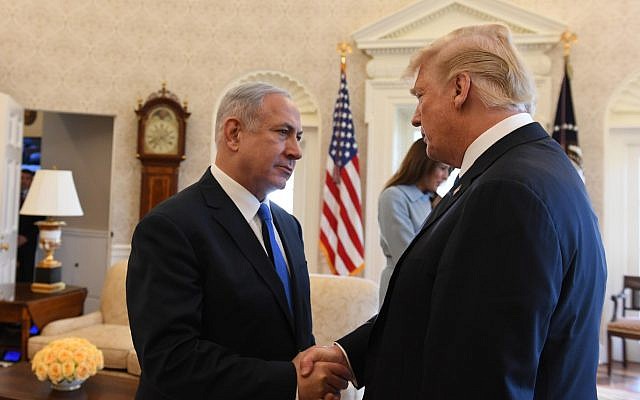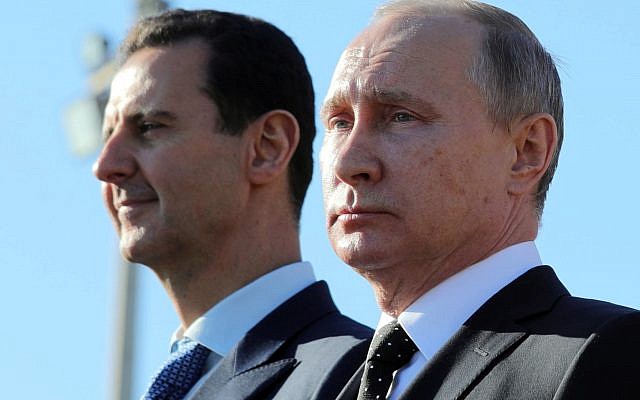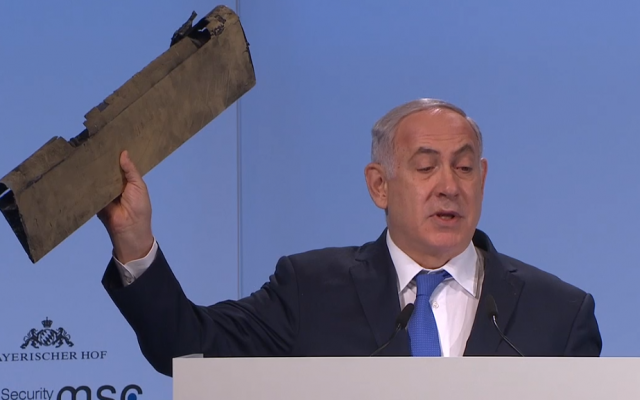Though strongly backing US-led airstrikes, Jerusalem also reportedly worried Putin may now supply Assad with advanced air-defense systems, reducing Israel's air supremacy

Prime Minister Benjamin Netanyahu (left) and US President Donald Trump in the White House Oval Office, March 5, 2018 (Haim Tzach/GPO)
While Israel’s Prime Minister Benjamin Netanyahu firmly backed the US-led airstrikes on Syria in the wake of its use of chemical weapons, Israeli security chiefs made clear on Saturday night that Israel fears the Trump Administration will now consider that its work in Syria is done, and leave Israel alone to face the dangers posed by Iran’s growing military presence in Syria.
Israel’s defense chiefs are also reportedly worried that Russia’s President Vladimir Putin, seeing Syria under US-led attack, may provide President Bashar Assad with more advanced air defense systems — which could reduce Israel’s air supremacy in the skies of Syria and Lebanon. A Russian general indicated such an arms supply was possible in comments on Saturday.
Israel’s Channel 10 news reported on Saturday that Israel and the US held numerous discussions ahead of the US-led strike, that Netanyahu’s national security adviser spoke to British and French officials, and that these talks reflected Israel’s profound concern over the Iranian military’s growing involvement and presence in Syria.
Speaking on condition of anonymity, a senior Israeli security source told Israeli media on Saturday night:
“The attack will enable the Americans to say, we’ve done what was necessary, and withdraw from Syria...In such a scenario, “Israel remains alone, facing the threat of Iran establishing itself on the northern border,” the source said.

Syrian government supporters chant slogans against US President Trump during demonstrations following a wave of US, British, and French military strikes to punish President Bashar Assad for suspected chemical attack against civilians, in Damascus, Syria, Saturday, April 14, 2018. (AP Photo/Hassan Ammar)
US President Donald Trump has repeatedly made clear his aim of withdrawing US forces from Syria as soon as possible. In his speech announcing the air strikes on Friday, Trump stressed: “America does not seek an indefinite presence in Syria under no circumstances. As other nations step up their contributions, we look forward to the day when we can bring our warriors home.”
In further comments underlining Israel’s concerns about finding itself alone on the front line, Trump also said, “No amount of American blood or treasure can produce lasting peace and security in the Middle East. It’s a troubled place. We will try to make it better, but it is a troubled place. The United States will be a partner and a friend, but the fate of the region lies in the hands of its own people.”
Israel is also reportedly worried that Putin may utilize the US-led strike as a pretext to justify making some of its advanced air defense systems available to Assad, Israel’s Hadashot TV reported Saturday night.
The report cited fears in the Israeli security establishment that the airstrike “will give Russia the excuse to ignore Israel’s demands and accelerate the supply to Assad of advanced air defense systems which could impinge upon Israel’s air supremacy.”

This Dec. 11, 2017 photo shows Russian President Vladimir Putin, right, and Syrian President Bashar Assad watching troops march at the Hemeimeem air base in Syria. (Mikhail Klimentyev, Sputnik, Kremlin Pool Photo via AP, File)
Earlier Saturday, a Russian general said Moscow may indeed now consider supplying S-300 surface to-air missile systems to Syria and others.
Colonel-General Sergei Rudskoi said Russia had “refused” to supply these systems to Syria, “taking into account the pressing request of some of our Western partners.” But in the wake of the Allied airstrikes, he said, “we consider it possible to return to examination of this issue not only in regard to Syria but to other countries as well.”
Israel has repeatedly urged Putin not to bolster Assad’s air defenses.
The imperative for the Israeli air force to retain its freedom of operation against Syria and Lebanon was underlined last Monday, when Israel allegedly struck the T-4 air base in central Syria where Iran has reportedly been building a fully functional air base of its own and where it has centered its attack drone operations. The base was reportedly protected by surface-to-air missile defense systems among other defenses.
At least seven members of the Iranian military were killed in the strike, and Iran has vowed to hit back at Israel — prompting a heightened alert by the Israeli military in the north of the country.

Prime Minister Benjamin Netanyahu waves part of an Iranian drone downed in Israeli airspace on February 10, 2018, during a speech on the third day of the 54th Munich Security Conference (MSC) held at the Bayerischer Hof hotel, in Munich, southern Germany, on February 18, 2018. (Screen capture)
While refusing to comment on whether it carried out the strike, Israel on Friday revealed for the first time that an Iranian drone dispatched from T-4 in February was an attack drone that carried explosives and was headed to an unspecified location in Israel when it was shot down 30 seconds after entering Israeli airspace....

National Security Adviser Meir Ben-Shabbat. (Amos Ben Gerschom/GPO)
...Israel’s National Security Adviser Meir Ben-Shabbat spoke on Thursday to his British counterpart, and on Friday to a senior French presidential adviser. According to western diplomats quoted in the report, Israel was at pains to stress that “Iran is the problem” and that strikes on Assad’s chemical weapons facilities, while emphatically necessary, won’t solve it.
